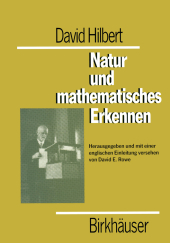 Neuerscheinungen 2012Stand: 2020-01-07 |
Schnellsuche
ISBN/Stichwort/Autor
|
Herderstraße 10
10625 Berlin
Tel.: 030 315 714 16
Fax 030 315 714 14
info@buchspektrum.de |

D. E. Rowe
David Hilbert Natur und mathematisches Erkennen
Herausgegeben von Rowe, D.E.
Softcover reprint of the original 1st ed. 1992. 2012. xxiv, 101 S. XXIV, 101 S. 244 mm
Verlag/Jahr: SPRINGER, BASEL; BIRKHÄUSER BASEL 2012
ISBN: 3-03-489710-3 (3034897103)
Neue ISBN: 978-3-03-489710-5 (9783034897105)
Preis und Lieferzeit: Bitte klicken
At the time of David Hilbert´s death in 1943, his leading disciple, Her mann Weyl, wrote that " . . . the era of mathematics upon which he impressed the seal of his spirit and which is now sinking below the horizon achieved a more perfect balance than prevailed before and after, between the mastering of concrete problems and the formation of general abstract concepts. "l Weyl attributed this "happy equilibrium" in no small part to Hilbert ´s work and its influence, adding that "no mathematician of equal stature has risen from our generation. ,,2 Surely, it would be difficult to exaggerate the importance of Hilbert´s contributions to twentieth-century mathematics or even to conceive of what mathematics today would be like without them. He overturned the concep tual framework of older fields ranging from invariant theory and algebraic number theory to the foundations of geometry. He rehabilitated the Dirich let Principle, propelled integral equation theory to the forefront of active research, derived the field equations governing Einstein´s general theory of relativity, created modern proof theory and metamathematics, and through out his career he championed the power and efficacy of the axiomatic method not only for mathematics but for all of the exact sciences. Every educated mathematician knows something about Hilbert space, the Hilbert problems, and Hilbert ´s formalist program.
Erster Teil Die übliche Auffassung von der Mathematik und ihre Widerlegung.- 1 Die Rolle von Anschauung und Erfahrung.- 2 Die Rolle der Voraussetzungen.- 3 Die Nichtuntrüglichkeit des mathematischen Schliessens.- Zweiter Teil Die landläufige Auffassung von der Physik und ihre Berichtigung.- 4 Physikalische Begriffsbildungen.- 5 Die Gesetze der Physik und ewige Naturgesetze.- 6 Die Beziehung zwischen Theorie und Experiment.- Dritter Teil Fragen philosophischen Charakters.- 7 Physikalische Gesetzlichkeit und Kausalität.- 8 Naturgeschehen und Wahrscheinlichkeit.- 9 Die Rolle von idealen Gebilden.


